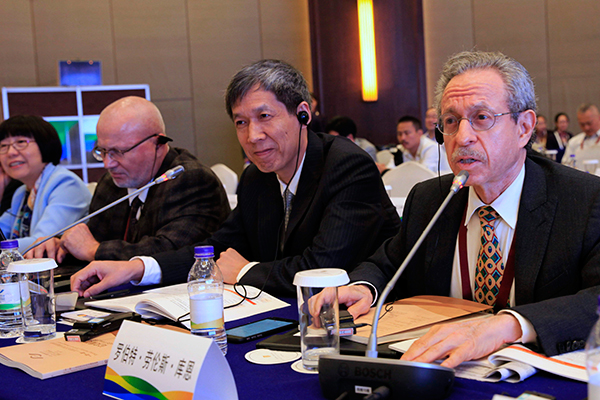 |
|
Robert Kuhn (right), a US expert on China and a host on China Central Television, speaks at the media session of the International Seminar on the Belt and Road Initiative in Xi'an, Shaanxi province on Tuesday. [Photo/China Daily] |
Expert: Belt and Road strategy will be applauded years from now as visionary
The first US presidential debate might have been the most-watched event around the globe on Monday night local time, with the expected protectionist remarks made by candidates Donald Trump and Hillary Clinton.
Yet, at the same time, across the Pacific Ocean, the Belt and Road Initiative, launched by China three years ago to foster economic ties, gained momentum as media from China and abroad expressed support.
"I know many people think the most important event today is the debate, which is going on right now," Robert Kuhn, a US expert on China and a host on China Central Television, said on Tuesday at the media session of the International Seminar on the Belt and Road Initiative in Xi'an, Shaanxi province.
"However, looking back in 50 years or 100 years, I believe this is a more important event than the debate because it pushes forward an important initiative that is the direction of the future," Kuhn said at the two-day seminar. China Daily is a co-organizer.
In 2013, President Xi Jinping proposed the Silk Road Economic Belt, which includes countries situated on the original Silk Road, passing through Central Asia, West Asia, the Middle East and Europe, as well as the 21st Century Maritime Silk Road, which covers Southeast Asia, Oceania and North Africa.
By the end of June, China had signed cooperation agreements with more than 30 countries regarding the initiative and is working with another 20 on capacity building projects in the manufacturing sector, according to a report by Renmin University of China.
"Some countries that start to turn inward, start to talk protectionism, seem to be more skeptical about trade. This initiative is moving in the opposite direction. It promotes cooperation and business across the border," said Jason Eugene Subler, Greater China bureau chief of Reuters.
Some 100media representatives from about 20 countries attended the seminar and reached a written consensus to be "a champion of the Silk Road Spirit", referring friendship and cooperation throughout history, and to be "an active supporter of the initiative".
Wilson Flores, a columnist at the Philippine Star newspaper, said the initiative allows the media in participating countries to better cooperate and to enrich the diversity of media voices, which has long been dominated by Western news organizations.
"As we evolve into a more diverse and multipolar world, developing nations in Central Asia, Europe, Southeast Asia, Africa and other regions need to have our news perspectives and voices heard."
Kang Bing, deputy editor-in-chief of China Daily, suggested that media organizations along the route can jointly identify topics to cover, develop applications together, co-produce microvideos and launch special columns, reports and web pages on the platform of other countries.
